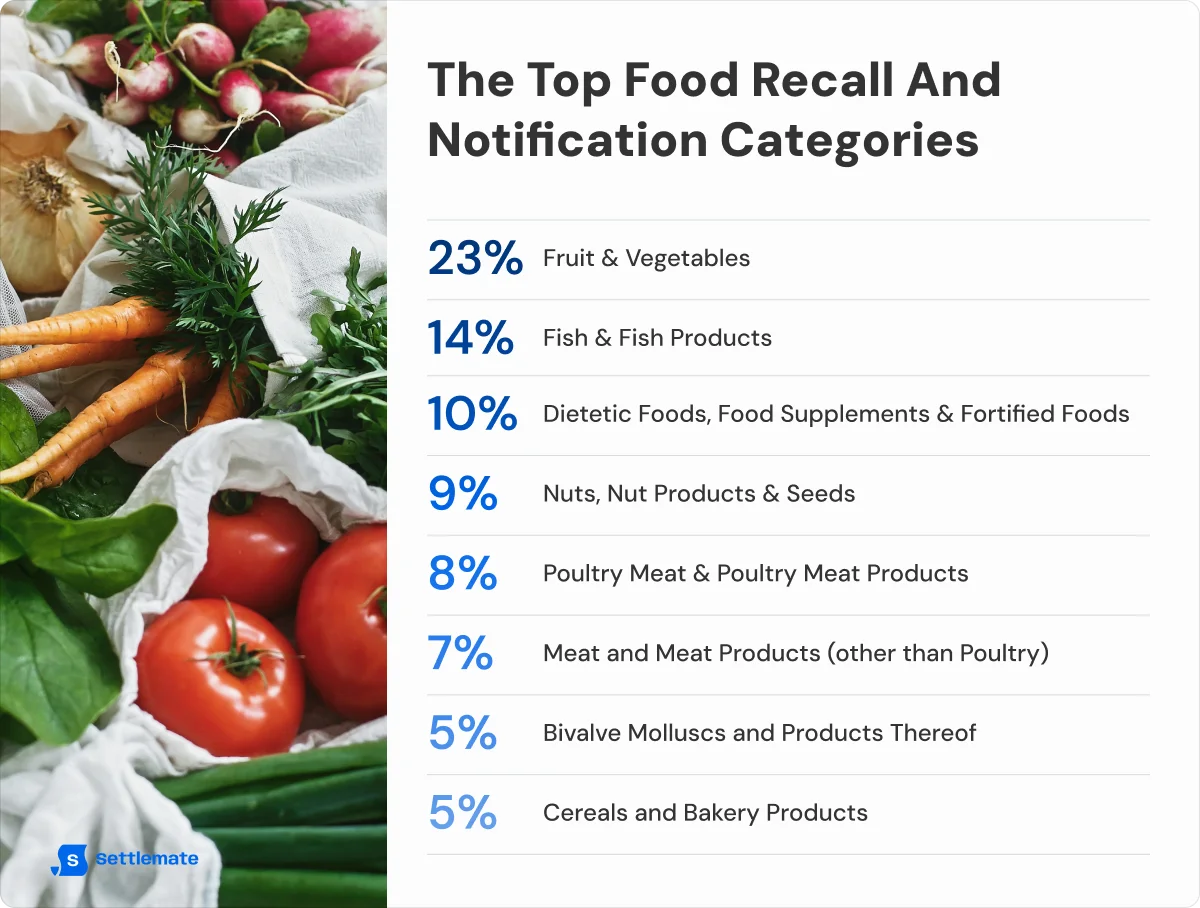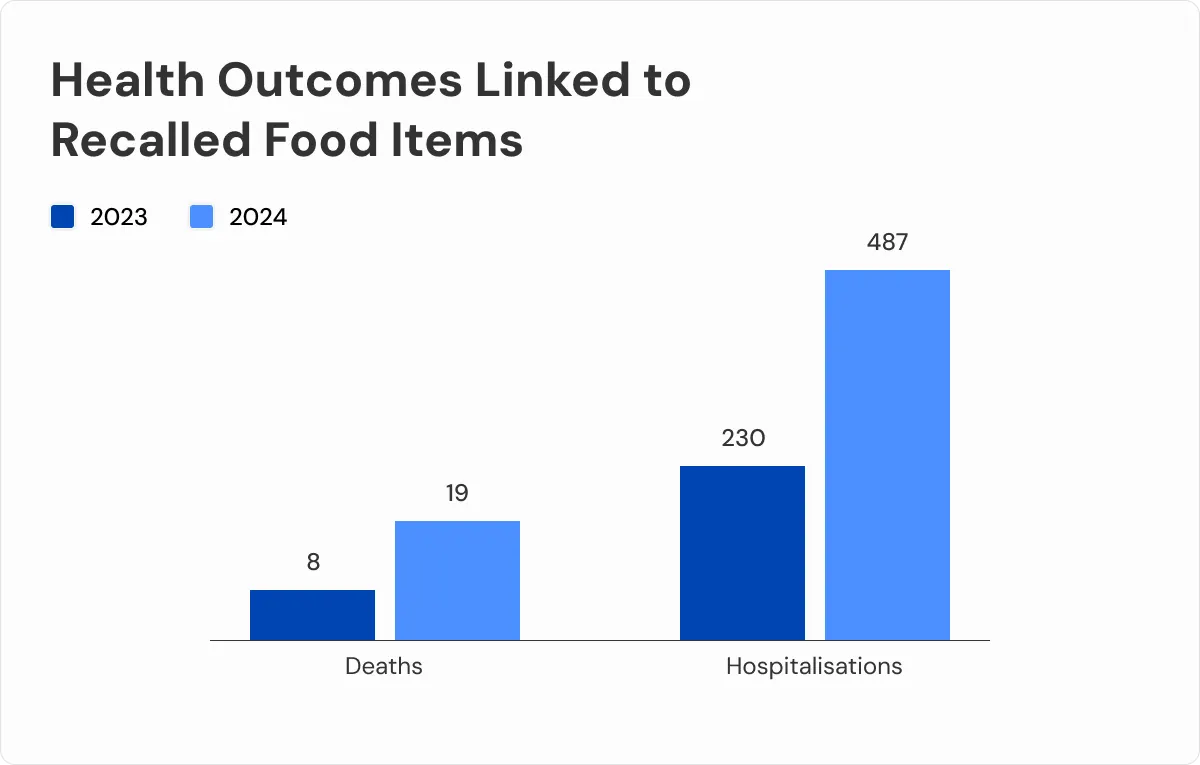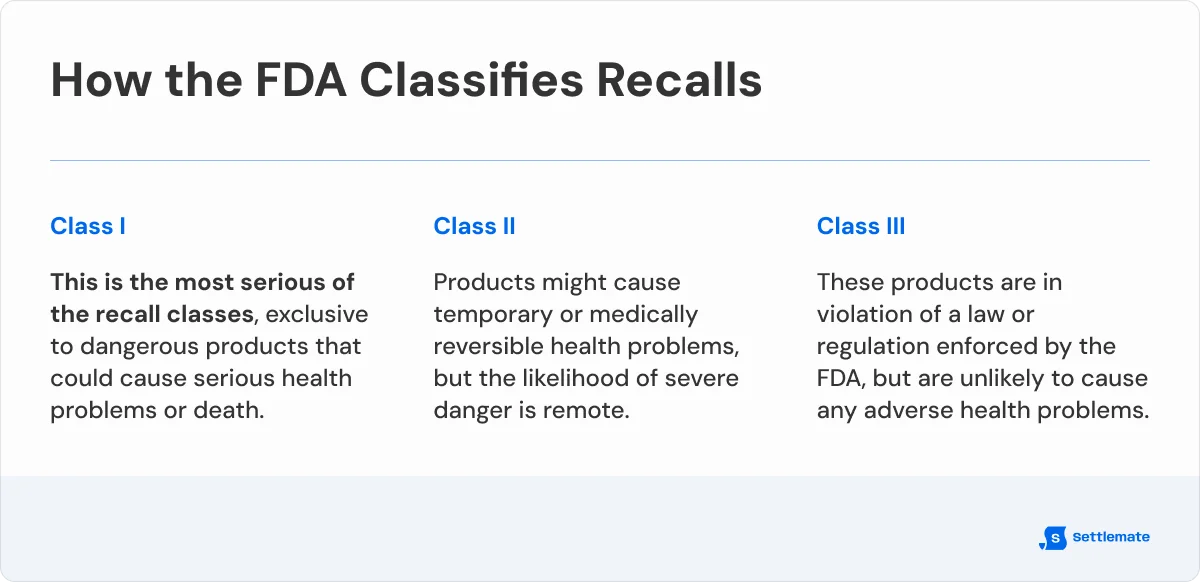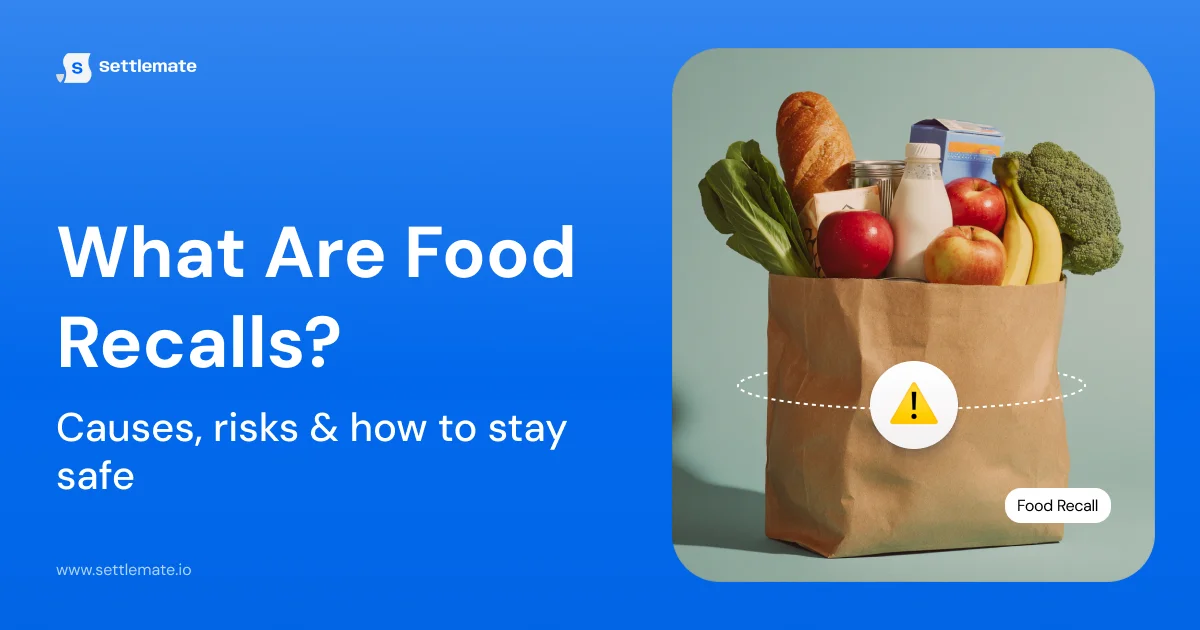Have you ever wondered what are food recalls and why they seem to be making headlines more often in 2026?
In the first quarter alone, FDA recall volumes jumped 232%, signaling a sharp rise in products flagged for potential danger.
These recalls act as early-warning signals, catching problems before they cause serious harm.
The challenge is knowing how to respond: spot the alert, remove the risk, and recover your costs. This article will help you act with confidence, turning a stressful recall into a smart move that protects your health and home.
Key takeaways:
- Food recalls are a critical safety measure: Regulators and companies remove products from the market that may be unsafe or mislabeled, often before they harm anyone. The FDA and USDA oversee and publicize these actions to keep risky food out of kitchens.
- Recalls fall into three risk categories: Class I recalls pose a high risk of serious illness or death, Class II recalls involve moderate but reversible risks, and Class III recalls typically involve regulatory violations without direct health hazards. Knowing the difference helps you respond appropriately.
- Common causes include more than just bacteria: While Salmonella, Listeria, and E. coli are major triggers, recalls also stem from undeclared allergens, foreign objects, toxic contaminants like lead, and quality control failures such as spoilage or mislabeling.
- Being informed is the first step to safety: Reliable recall alerts come from official government sources like FoodSafety.gov, the FDA, and the USDA. You can also stay updated through credible news outlets, in-store notices, and trusted social media channels.
- Have a clear action plan when a recall affects you: Stop using the product, follow disposal or return instructions, clean affected areas, monitor for symptoms, and check for recall updates. Acting quickly can prevent illness and ensure you get your refund or compensation.
- Settlemate makes recall management effortless: Settlemate monitors your purchases, alerts you instantly if a recalled item matches them, guides you through refunds or claims, and keeps everything organized in one dashboard.
What are food recalls?
A food recall is an action to remove a food product from the market because it may be unsafe or improperly labeled.
In other words, if a company or regulators discover a problem with a food, such as contamination or mislabeling (e.g., an allergen not listed on the label), they will recall that product to prevent people from eating it.

Under U.S. law, most recalls are voluntary, but the FDA gained authority through the Food Safety Modernization Act to mandate a recall if a company fails to act on a serious hazard.
Food recalls happen more often than you might think.
FSNS's 2024 statistics show exactly how serious the recall landscape has become:
- 296 total recalls (FDA + USDA), only a slight drop from 2023
- 1,392 people sickened, up from 1,118 in 2023
- 487 hospitalizations, over twice the 230 reported in 2023
- 19 deaths, more than double the eight recorded in 2023

However, not every recall means people are getting sick, because many recalls are precautionary.
In fact, companies often recall products before they cause any harm, and most recalls have no outbreak linked to them at the time.
Who oversees recalls?
Two agencies share the task of monitoring food safety.
- The FDA oversees about 77% of the U.S. food supply (everything from produce to packaged foods to pet food).
- The USDA's FSIS oversees meat, poultry, and certain egg products.
These agencies publish recall notices on their websites and alert the public. Whether the recall is voluntary or mandated, the goal is the same: get the risky food off shelves and out of people's kitchens.
How food recalls are categorized
Not all food recalls are equally serious.

The FDA (and USDA) classify recalls into three classes based on the level of hazard to health:
1. Class I recall (high risk)
Regulators issue this recall when they reasonably believe the food could cause serious health problems or death. Put simply, eating this food carries a high risk of severe illness.
Examples of Class I issues include:
- Food contaminated with deadly bacteria like Listeria or Salmonella.
- The presence of a toxin like botulinum (which causes botulism).
- An undeclared allergen (e.g., a product contains peanuts but doesn't list them on the label).
For instance, in early 2025, a garden salad mix was recalled and classified as Class I because it had undeclared peanuts - a potentially deadly issue for people with peanut allergies.
2. Class II recall (moderate risk)
A Class II recall is for situations where the food may cause temporary or reversible health problems, or the chance of serious harm is much lower. These are concerning issues, but not as immediately dangerous as Class I.
An example might be a food that has a contaminant that could make you mildly ill, or a situation like minor labeling mistakes. For instance, finding norovirus (which can cause gastrointestinal illness) in a batch of shellfish might prompt a Class II recall.
Another real example: in March 2025, a decaf coffee was recalled as Class II because some "decaf" bags actually contained caffeine. This is not life-threatening, but it is potentially harmful for individuals who must avoid caffeine.
Class II issues should still be taken seriously (nobody wants to get sick if it's avoidable), but they're not usually fatal hazards.
3. Class III recall (low risk)
Class III recalls involve products that violate regulations but are not likely to cause any health harm.
Basically, these are quality or compliance issues. Eating the food won't make you sick, but there's an underlying issue that needs attention. Examples include:
- Mislabeling or packaging errors that don't affect safety (e.g., incorrect weight on the label),
- Improperly branded food (such as non-organic products labeled organic),
- Products produced in unsanitary conditions without evidence of contamination.
While Class III recalls don't pose health risks, companies still must fix these issues to stay compliant with laws.
Why do food recalls happen?
A variety of problems can trigger food recalls.
.webp)
Here are the most common causes:
1. Contamination by harmful pathogens
One of the most alarming causes is finding dangerous bacteria, viruses, or other pathogens in food. Salmonella, Listeria, and E. coli are frequent causes of contamination.
These microorganisms can cause severe foodborne illness (food poisoning) outbreaks. Pathogens accounted for roughly 39% of food recalls in 2024.
High-profile examples include:
- Imported cucumbers (2024): A Salmonella outbreak tied to this produce sickened 551 people across 34 states and D.C.
- Boar's Head deli meats (July 2024): Listeria contamination in deli meats caused 61 illnesses and 10 deaths in 19 states.
- Frozen half-shell oysters (March 2025): The FDA recalled certain frozen oysters from South Korea for possible Norovirus contamination.
- Frozen berries (2023): The FDA issued a recall of frozen organic strawberries and tropical berry blends due to hepatitis A contamination.
2. Undeclared allergens or mislabeling
This is the #1 cause of recalls by number. In 2024, undeclared allergens were the leading trigger, responsible for about 34% of recalls (101 out of 296 recalls).
This happens when a food contains an ingredient (like peanuts, tree nuts, milk, eggs, wheat, soy, shellfish, etc.) but manufacturers don't list it on the label. Since millions of Americans have food allergies, such a mistake can be life-threatening.
In a recent case, Frito-Lay had to recall Tostitos chips because some bags of plain tortilla chips accidentally contained a cheese flavor with undeclared milk, posing a serious risk to people with milk allergies.
Undeclared allergen recalls are almost always Class I due to the potential for deadly anaphylactic reactions.
3. Foreign objects (physical contaminants)
Finding extraneous objects in food, like pieces of metal, glass, plastic, or wood, will prompt a recall because these objects can injure or choke consumers.
In 2024, there were at least a dozen recalls for foreign materials in foods. A recent example was the recall of over 10,000 cans of Coca-Cola in Illinois and Wisconsin due to the possible presence of plastic bits in the soda.
Eating or drinking products contaminated with shards of metal or plastic can lead to dental injuries, cuts in the mouth/throat, or internal wounds.
4. Chemical or toxic contaminants
Sometimes foods are recalled because they contain hazardous chemicals or toxins.
This could be anything from excessive pesticide residue to cleaning chemicals contaminating food, or even natural toxins.
One growing concern is heavy metal contamination. For example, in 2024, there were 13 recalls due to excessive levels of lead in products (one notable case was a recall of cinnamon for lead).
Another unusual case saw a company recall its "mushroom-infused" chocolate after it tested positive for the psychoactive toxin muscimol, which sickened over 100 people.
5. Quality control issues and other violations
Some recalls happen because the product deviates from safety or quality standards in ways not covered above.
For example, a manufacturer might recall a food stored at the wrong temperature or produced under unsanitary conditions, even without identifying a specific germ, out of caution that it could be unsafe.
If they find a product spoiling or decomposing prematurely, such as jars of sauce fermenting due to a production error, they may also initiate a recall.
How to stay informed about food recalls
The first step in protecting yourself is knowing when a recall happens. Here's how U.S. consumers can stay up-to-date on food recalls:
Official government alerts
The most reliable way to track recalls is through official sources. FoodSafety.gov combines FDA and USDA recalls in one place, with a homepage widget listing the latest alerts and a free email subscription service.
Both the FDA and USDA FSIS update their recall pages daily, covering all FDA-regulated foods and meat/poultry, respectively.
News and media
Major recalls often make headlines, especially when well-known brands are involved.
Here are quick ways to stay updated on major food recalls:
- Watch evening news segments for major recall announcements.
- Check major newspapers' print or online editions.
- Follow consumer-focused sites like Food Safety News for detailed coverage.
- Set up Google Alerts for the term "food recall" to get notifications.
- Scan weekly recall roundups, such as Health.com's March 2025 recap of Coca-Cola, Tostitos chips, and coffee recalls.
Most importantly, always confirm details through FDA or USDA sources.
In-store notices
In the U.S., many grocery stores display recall notices in-store, often near the customer service desk or on the shelves where they sold the product.
If you shop at a store regularly, check their bulletin board or entrance area for any recall announcements.
Some stores even have loyalty card systems that will call or email you if you purchase a recalled product.
Social media and community
Follow consumer advocates or organizations on social platforms.
Here are some social platforms and communities where food recall alerts often spread early, perfect for staying in the loop:
- Facebook groups:
- eFoodAlert: A public group focused on food safety topics and recall updates
- Recall Alerts - USA: Members share and discuss product recalls, with a focus on consumer protection
- X (formerly Twitter) accounts:
- @FDArecalls: The official U.S. FDA recall channel - timely, direct alerts
- @Recall_Alerts: Covers important food recalls and related information
- Reddit communities:
- r/Foodrecalls: A dedicated subreddit where users share and discuss recall news in real time
Just be cautious: always verify the details from an official source. There can be false alarms or old recalls recirculated on social media.
Leverage technology and apps
Apps and email lists can bring recall alerts straight to you.
The USDA offers a free email list, and tools like Settlemate can scan your receipts and flag recalled items you've purchased, eliminating the need to check every recall manually.
What to do if you have a recalled product
Finding a recalled item in your pantry or fridge can be unsettling, but handling it the right way protects both your health and your wallet.
Consider this your food recall safety checklist:
- Stay calm and read the recall notice: Understand the risk and urgency before acting.
- Stop using it immediately: Don't eat, serve, or feed it to pets; set it aside safely.
- Don't open or handle it further: If the food is already opened, wash your hands thoroughly after touching it.
- Follow the recall instructions: Return for a refund or dispose of it securely so no one can access it.
- Clean and sanitize: Wash and disinfect any surfaces or utensils that it touched.
- Monitor your health: Watch for symptoms linked to the contamination and call your doctor if they appear.
- Stay updated: Check if the recall expands to more products or lot codes.
- Claim your refund or compensation: Most stores refund recalled products without a receipt, and some recalls may qualify for settlement claims.
Settlemate's approach to making recall claims and refunds easy
Dealing with the aftermath of a food recall can be a hassle. It includes tracking news, checking your fridge, going to the store for refunds, and filling out claim forms if there's a settlement.
This is where Settlemate comes in as a game-changer for consumers who want clear answers about what food recalls are and how they impact their purchases.
Settlemate is a tech service designed to put money back in your pocket when things like recalls or class action settlements happen, all with minimal effort on your part.
Here's how Settlemate can help you navigate food recalls:
- Personalized alerts: Settlemate tracks your purchases through email receipts or linked accounts and instantly notifies you if it recalls something you bought. You do not have to scroll through FDA or USDA lists because Settlemate delivers a targeted alert, such as, "That salad mix you bought last week was recalled. Here's why and what to do."
- Hassle-free refunds and claims: Provides step-by-step guidance for getting refunds and, if a recall leads to a class action settlement, checks your eligibility, alerts you, and even pre-fills the claim form.
- Centralized tracking: Organizes all recall actions, including refunds, claims, and payouts, in one dashboard. If you had five recalled items in a year, Settlemate would catch and track all of them, even those you never heard about.
- No per-claim fees: Works on a flat subscription model with unlimited claims. You keep the full payout, whether it is $5 or $500, and Settlemate offers a money-back guarantee if you do not earn more than your subscription cost in the first year.
- Peace of mind: Handles the monitoring, alerts, and paperwork so you do not have to worry about missing an important recall. During large-scale recalls, this means you get clear instructions without sorting through confusing updates.
- Bonus benefits: Goes beyond food recalls by also covering price drop refunds, product settlement claims, and other money-back opportunities.
Want to be the first to know when a recall hits your purchases?
Join Settlemate today and let timely alerts protect your health and your wallet.









